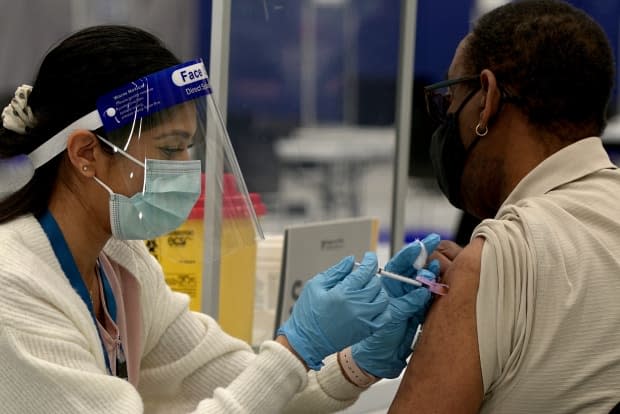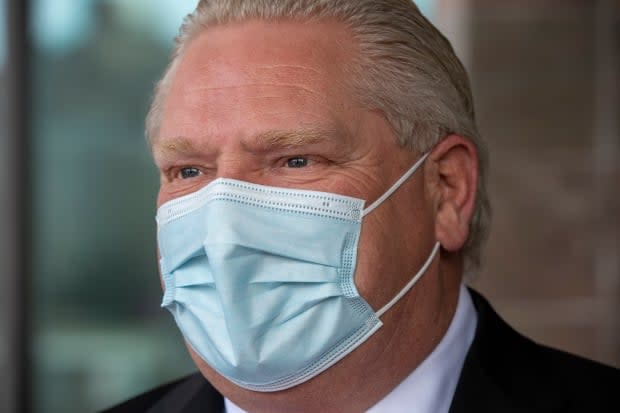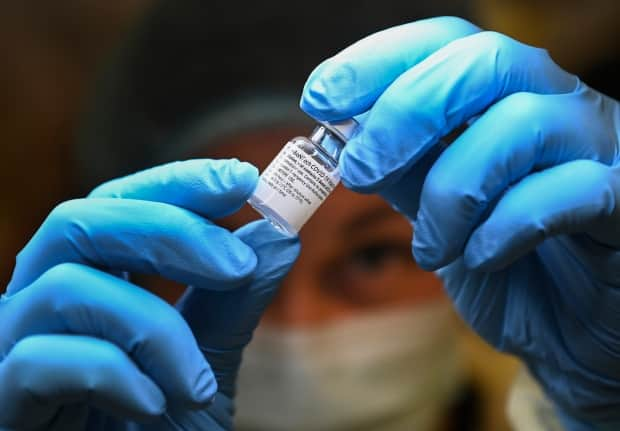Ontario announces plans to 'rapidly accelerate' vaccine rollout

Ontario expects to give all adults 60 and older a first dose of COVID-19 vaccine by early June, officials said Friday, as they detailed who will qualify for a shot during Phase 2 of the province's immunization campaign.
That's at least a month sooner than originally planned. Ontario's rollout strategy was recently revised amid a wave of vaccine-related news, including the approvals of a third and fourth vaccine for use in Canada and the option to space out shots of the Pfizer-BioNTech and Moderna vaccines by up to four months.
Notably, however, the updated rollout plan presented by officials was put together before some significant announcements today. This morning, Health Canada gave a green light to the one-shot Johnson & Johnson vaccine, and Prime Minister Justin Trudeau said Canada should expect up to 1.5 million more doses of the Pfizer-BioNTech vaccine in March than expected.
At a news conference, provincial officials said those developments could speed up implementation of the rollout, especially during Phase 2, which is set to run between now and the end of July.
Officials said they expect to begin immunizing Canadians with some underlying health conditions, caregivers in congregate settings and adults in some COVID-19 hotspots by the start of April.
WATCH | Hillier talks about vaccine rollout:
Another category of residents, defined as those who cannot work from home, could start getting first doses at the beginning of June. That includes educators and school staff, first responders and workers in sectors such as manufacturing and food processing.
A list of eligible health conditions and COVID-19 hotspots can be found in the province's slide show embedded at the bottom of this story.
At a news conference Friday afternoon, Premier Doug Ford said the province is "making incredible progress" in its vaccination plan.
"The light at the end of the tunnel gets brighter, so let's keep working together to beat this," Ford said.
Retired general Rick Hillier, who is running the province's vaccination task force, called this a "seismic shift." Officials are "gaining confidence" in the steady flow of vaccines, and those numbers are growing each week, he said.
Hillier also said he hopes everyone who is eligible to get a vaccine and wants it will be able to get their first dose by the first day of summer.
A provincial spokesperson later clarified that Hillier was referring to Ontarians over 18 — but added that those plans hinge on vaccine supply. No vaccines have yet been approved for children.
WATCH | Ford on vaccine plans:
Choices about vaccines?
Members of the vaccine task force said they expect 133 mass vaccination clinics to begin operating in 26 of 34 health units by the end of March.
About 80 per cent of all vaccine doses administered during phases two and three will be done through these clinics, officials said.
They stressed, though, that what vaccine someone receives will depend on where they live and how they choose to get it.

Because each of the four vaccines approved in Canada have different characteristics, some people will be limited in terms of choice.
AstraZeneca-Oxford will be administered mostly through pharmacies and primary care clinics, for example, because it can be stored safely in a regular fridge.
Ontario anticipates 194,500 doses of the AstraZeneca vaccine to arrive the week of March 8. They will be used to give first doses to adults aged 60 to 64.
Stay-at-home orders lifted
Meanwhile, stay-at-home orders in Toronto, Peel and North Bay Parry Sound are being lifted, the province also announced Friday, with those regions transitioning back into Ontario's previous COVID-19 framework effective Monday, March 8.
North Bay Parry Sound will be returning to the framework at the red-control level, the province said in a news release, while Toronto and Peel will enter the grey lockdown level.
"Our government is taking a safe and cautious approach to returning to the framework and due to our progress, all regions of the province will soon be out of the provincewide shutdown," Minister of Health Christine Elliott said in a statement.
"Despite this positive step forward, a return to the framework is not a return to normal. As we continue vaccinating more Ontarians, it remains critical for everyone to continue to follow public health measures and stay home as much as possible to protect themselves, their loved ones and their communities."
You can read the province's breakdown of each tier of the framework here.
Several recent developments forced members of the vaccine task force to revise Ontario's immunization strategy.
AstraZeneca's vaccine was approved for use by Health Canada late last week, while this morning, the agency gave a green light for use of the one-shot Johnson & Johnson vaccine. The federal government has ordered 10 million doses of the vaccine — the fourth to be approved in Canada — with an option for 28 million more.
The National Advisory Committee on Immunization (NACI) subsequently recommended that the AstraZeneca vaccine only be used for people under the age of 65. As more real-time evidence on the efficacy of the vaccine has become available, however, pressure has mounted for NACI to change course.
Ontario Solicitor General Sylvia Jones suggested this week that, at least for now, Ontario will use the AstraZeneca vaccine for adults between the ages of 60 and 64.
Both France and Germany had originally implemented similar guidance for the vaccine but have since reversed those decisions, citing evidence from countries such as the United Kingdom and Israel, where the AstraZeneca vaccine is already being administered to adults 65 and over.

And earlier this week, NACI said that provinces can safely extend the time between shots of the Pfizer-BioNTech and Moderna vaccines up to four months.
The move followed an announcement by health officials in British Columbia, who said just days earlier they would implement a 16-week interval to ensure that more people got a first dose of vaccine earlier.
Both vaccines have been shown to be more than 90 per cent effective at preventing severe illness and death from COVID-19 after a single dose.
According to the ministry, health units administered 35,886 doses of vaccines yesterday, a third straight record high day in the province. A total of 269,063 people in Ontario have now been given both shots of a vaccine.
Medical Officer of Health Dr. David Williams said on Thursday that he remains concerned about the presence of "variants of concern."
"These are not insignificant numbers," he told reporters. "We want to be cautious at this time."
Most new cases in a week
Meanwhile, public health units reported another 1,250 cases of COVID-19 this morning, the most on a single day in a week.
The new cases include 337 in Toronto, 167 in Peel Region and 129 in York Region.
They come as Ontario's lab network completed 64,748 test samples for SARS-CoV-2, the virus that causes COVID-19, and logged a test positivity rate of 2.3 per cent.
Labs also confirmed 155 more cases linked to the virus variant first identified in the United Kingdom, bringing the total thus far to 799.
On Wednesday, 1,002 test samples provincewide were screened for the tell-tale spike gene that suggests the presence of a variant of concern. The spike was detected in 308, or nearly 31 per cent, of those samples. Those samples are then sent for whole genomic sequencing to determine the specific variant of concern.
The seven-day average of daily cases stands at 1,063.
The Ministry of Education also reported another 96 school-related cases: 82 students, 13 staff members and one person who was not identified. Twenty-nine schools are currently closed due to the illness. That's about 0.6 per cent of Ontario's 4,828 publicly funded schools.
Public health units recorded the deaths of 22 more people with the illness, pushing Ontario's official toll to 7,046.
Health officials said today that Phase 1 of the vaccination effort has dramatically reduced cases of COVID-19 in long-term care homes and the number of deaths across all age groups.

 Yahoo Movies
Yahoo Movies 